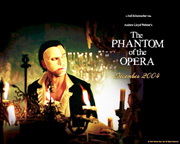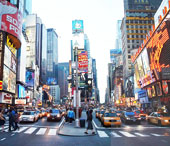On September 1, 2006, The Phantom of the Opera was performed for the 7,486th time in New York.
That's 800 times more than Les Miserables, 1,300 times more than A Chorus Line. No other musical has ever been performed as many times in Broadway. Andrew Lloyd Webber's baroque pastiche became that first night of September the most peformed (and thus, the most financially successful) musical in Broadway history.
The fact that this was such an event, reported by the media all over the world, speaks volumes of the importance of theater in New York -- a city so inherently theatrical and so devoted to entertainment that it has made the stage its own art form. Everywhere else in the world, "New York" acts a brand, a guarantee of quality. Which is funny, because quantity-wise there are much more theaters in New York that anywhere else.

As soon as transportation and wages in the Big Apple started to resemble our modern concept of transportation and wages, people started to seek entertainment outside their local bars and festivities. Specifically, they would go to to a desolate (and therefore) cheaper which would soon be known as Times Square but that back then was known as Broadway. When electricity kicked in, theater owners set up big luminous signs to promote their plays. Since there was a theater virtually all the way until the end of street, Broadway became the Great White Way.
But it was more than a street. It was a way of life. It was how the very diverse New Yorkers would connect to each other, "talk" to each other as it were. It helped the diverse communities that comprised the area to realize that they all had similar concerns and hopes. As good art does, it brought people together.
At first, it was with the visceral kicks of vaudeville. But when movies took over that feeling in early 20th century, more "serious-minded" plays began to take hold. Plays written by professionals who would eventually belong to professional guilds and unions.
America's love for song demanded to include certain musical numbers into the plays, even if most of the time they had nothing to do with the actual plot. Thus, musical theater was born. It was fated to evolve, with time, into carefully crafted pieces where the sung parts and the dialogue would interwine seamlessly.

But the fact that professionals took over could mean that an alternative had to be created. In a time when Civil Rights were still unheard of and living off the arts wasn't as easy as it would later become, artistic minds with different opinions than those of credited "professionals" would seek different, unofficial venues in which to express themselves. They looked for theaters outside Broadway. And essentially, Off-Broadway was created -- a response to the commercial spirit behind people who needed their plays to be successful in order to make a living.
Off-Broadway became a staple of New York theater, and is also a testament to New Yorkers' perennial feeling of insatisfaction with any established system. It also goes to show just how much this city lives and breathes theater. It's not just one more option in its cultural landscape. It is the way the city works.